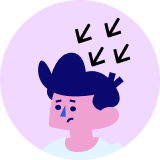Understanding OCD
Dealing with Obsessive-Compulsive Disorder (OCD) can be a significant challenge, but there are options available. At our Toronto clinic, we offer Neurofeedback Therapy as a specialized approach that may help manage your symptoms.
OCD is a mental health condition with persistent, intrusive thoughts (obsessions) and repetitive behaviours (compulsions).
The goal of these compulsions is to lessen the anxiety the obsessions cause. This can create a cycle that disrupts daily life.
Our Neurofeedback for OCD service in Toronto is designed to support your brain in learning healthier patterns. We're here to help you understand your options and work towards a brighter, more balanced future.
It is important to note that OCD is not simply a collection of habits; it can manifest as a complex interaction between emotional, behavioural, physical, and cognitive symptoms. Emotionally, people with OCD may experience heightened anxiety, fear, or frustration. Physically, symptoms may manifest as fatigue, changes in appetite, or even bodily pain. Behavioural symptoms can include avoidance of certain situations and places which can affect day-to-day activities. Cognitive symptoms may include difficulties with concentration, planning, and organization.
OCD can also impact a person’s instrumental activities of daily living (IADLs), which are activities that relate to an individual’s ability to live in the community. This can include activities such as managing finance, cooking, cleaning, communication, and transportation. Diagnosis often involves a comprehensive assessment by a clinical psychologist or psychiatrist. A formal diagnosis typically occurs after symptoms persist for a significant period, often over six months.
Our Approach to OCD
People who usually have anxiety demonstrate an excessive amount of activation in the anterior prefrontal cortex. Their brain is stuck in a processing or analyzing mode, and they find it tough to relax. Clients may also have a significant increase in delta and theta activity in the frontotemporal areas and a decrease in alpha activity in the left frontal region in resting states.
In Toronto, we use Neurofeedback Therapy to help clients who are struggling with these types of patterns. Once we figure out what brain wave patterns are related to your symptoms using Neurofeedback for OCD, we can design a personalized program to target and improve them. During each session using Neurofeedback for OCD, we monitor your brain waves in real-time. When there is a greater balance of brain wave patterns, we reward you with video and sound. These audio and visual rewards help train and guide your brain to have improved balance and improve your symptoms.
How Do I Get Started?

We start off with a Clinical Intake Interview. This is where we review background, medical, and developmental history, your symptoms and their severity, major life events and do our best to conceptualize the uniqueness of your case.

The next step is a Quantitative Electroencephalogram(QEEG) baseline recording. Just as a stethoscope is placed on your chest to listen to your heartbeat, electrodes are placed on your scalp to record your brainwave activity.

Using the information from your clinical intake interview, baseline recording, and intake package we put the pieces together to create a tailored program to suit your needs.

Using the information from your clinical intake interview, baseline recording, and intake package we put the pieces together to create a tailored program to suit your needs.
Research Articles on OCD
This section is meant to highlight research that has been done in the field of Neurofeedback Therapy. The following brief summaries are resources that we have gathered for the public, which may be helpful for those interested in Neurofeedback for OCD. For an in-depth look at each research article, we recommend using the citation to find and read the original article. We hope to add additional resources, especially from clinics here in Toronto, when possible!
Toronto Neurofeedback Therapy for Obsessive-Compulsive Disorder (OCD)
What is Neurofeedback for OCD, and how can it help me?
Neurofeedback for OCD is a non-invasive type of Neurofeedback Therapy that may help you manage your symptoms. The approach is rooted in the understanding that individuals with anxiety-related conditions often have specific brain wave patterns. During a session at our Toronto clinic, we monitor your brain activity in real-time. We then provide audio and visual feedback to help your brain learn to regulate itself and create healthier, more balanced patterns.
Is Neurofeedback for OCD a proven treatment?
Our approach to Neurofeedback Therapy for conditions like OCD is guided by clinical practice and research. The section on our website dedicated to research articles includes links to studies on Neurofeedback for OCD from various sources. We always recommend you speak with a qualified healthcare professional to determine if this approach may be right for you. We are happy to discuss the research with you during a consultation at our Toronto clinic.
What does a typical session of Neurofeedback Therapy in Toronto for OCD look like?
Your journey with Neurofeedback for OCD at our Toronto clinic begins with a clinical intake interview and a QEEG brain mapping. This helps us create a personalized program. During each session, we place sensors on your scalp to monitor your brain waves. You will receive real-time feedback through sights and sounds, which is designed to gently guide your brain towards more balanced activity. This process is passive on your part and aims to help your brain learn new patterns over time.
How is OCD diagnosed?
A diagnosis of OCD is made by a qualified mental health professional, such as a psychologist or psychiatrist, based on a comprehensive evaluation of a person's symptoms in the form of clinical interviews, self-report questionnaires, and clinically validated objective measures. The professional will discuss your thoughts, feelings, and behaviours to determine if you meet the criteria for OCD as outlined in diagnostic manuals. There are no lab tests or brain scans that can definitively diagnose the condition, but a thorough assessment provides an understanding of how your symptoms are impacting your life.
Is OCD inherited?
There is evidence to suggest that genetics may play a role in the development of OCD. Research indicates that if you have a close family member with OCD, you may be at a higher risk of developing the condition yourself. However, genetics is likely only a part of the story. It is thought that a combination of genetic factors and environmental influences may contribute to the onset of the condition.
Can a person with OCD fully recover?
While OCD is often considered a chronic condition, many people experience significant improvement and are able to manage their symptoms effectively with the evidence-based supports and lifestyle changes. The goal of treatment is not necessarily to eliminate every single thought or behaviour, but to reduce them to a level where they no longer interfere with your quality of life. Many people learn to manage their OCD so well that they can live full, productive, and happy lives.


